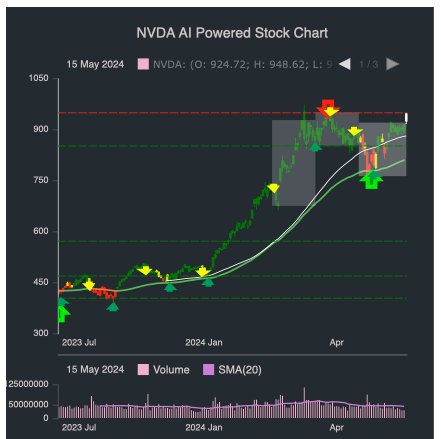20 Best Info On Choosing AI Stock Investing Platform Sites
20 Best Info On Choosing AI Stock Investing Platform Sites
Blog Article
Top 10 Ways To Evaluate The Quality Of Customer Support In Ai Trading Platforms For Stocks
Customer support is a critical element when deciding on a AI trading platform for predicting or analyzing stocks. Support that is responsive and reliable can make the difference when it comes time to solve issues, increase the use of the platform, and ensure a smooth trading environment and more. Here are our top 10 suggestions on how to evaluate the support provided by these platforms.
1. Review Support Accessibility
24/7 Support: Determine if the platform has round-theclock assistance. It's crucial, especially for trading on global markets.
Hours of operation. If support 24 hours a day doesn't exist, then make sure support is offered during business hours.
Make sure that support is available during holidays and weekends.
2. Test Response Times
Initial response Test the support team by submitting an uncomplicated test question.
Consider the time it takes for you to resolve problems rather than just acknowledging the issue.
Live chat If live chat is enabled Test its effectiveness and responsiveness.
3. Assess the Support Channels
Multiple channels: Make sure that the platform supports multiple channels, like live chat, email, telephone or social media.
Preferred channel: Verify that the preferred support channel you prefer (e.g. chat, phone) is available and reliable.
Self-service: Utilize a knowledge base or FAQs to quickly solve problems.
4. Check Support Quality
Experience: Ensure that the support staff have a an understanding of the platform, trading and technical issues.
Problem-solving: Evaluate whether support agents can effectively resolve complex problems or escalate them in a timely manner.
Professionalism: Check if the support interactions are courteous, professional and efficient.
5. Check for Dedicated Client Managers
Premium support: Check if higher-tier plans or institutional users have access to dedicated account managers.
Account managers who provide personalized and proactive assistance.
Relationship-building: Find out whether the manager of your account is accessible, and try to build long-term relationship with users.
Check the Documentation Support
Knowledge base: Ensure that the platform has the ability to search and organize a knowledge base that includes tutorials, guides, and assistance with troubleshooting.
Take a look at the video tutorials on the platform and webinars to see whether they're available to visually impaired learners.
API documentation. If you're an expert in programming, make sure the platform has a detailed and concise API documentation.
7. Evaluation of community and peer support
User forums - Check to see if the site provides a forum or a community in which users can share strategies and exchange solutions.
Social media forums - Look for unofficial Facebook, LinkedIn, Reddit and other social media websites where users discuss the platforms.
Community engagement: Ensure that the platform team is actively participating in discussions and forums for the community.
8. Evaluate Escalation Processes
Issue escalation. Be sure you have a defined process for escalating unresolved issues to the management or staff at a higher level.
Follow-up - Verify if the support team follows up with you after you've fixed the issue.
Feedback loops: Verify the platform's ability to collect user feedback in order to improve support services.
9. Test Support in critical situations
Contact support during periods of high volatility to determine their response.
Technical Problems: Try simulated an issue (e.g. login issue, data discrepancy) to observe how the support team handles the issue.
Trade execution - Verify that support is available to help with urgent concerns with trade (e.g. orders that are not executed, delays with execution).
10. Review Feedback from Users on Support
Reviews on the internet: Read user reviews on platforms like copyright, G2, and Reddit in order to assess the overall level of satisfaction.
There are testimonials available about positive experiences by searching case studies or testimonials.
Check out how the platform handles complaints and negative feedback.
Bonus Tips
Support during the demo or trial period.
Support for different languages: If you are not an English speaker, you should check whether there is a support service available.
Training and onboarding: See whether the platform has onboarding sessions or training to help new users get up and running.
These guidelines will help you assess the support provided by AI stock-predicting/analyzing trading platforms. In this way you'll be able select a platform that has reliable friendly, helpful and responsive assistance. Solid customer support can enhance your experience and ensure that you can make the most of all the features. Take a look at the top ai trading tools blog for more advice including ai stock picker, options ai, ai stock trading bot free, chatgpt copyright, ai investing platform, ai stock picker, best ai for trading, best ai trading app, ai investing, ai for investing and more.
Top 10 Ways To Evaluate The Regulatory Compliance Of Ai Stock Predictive/Analytical Platforms
When it comes to evaluating AI trading platforms, compliance with regulatory requirements is crucial. Compliance is crucial because it ensures the platform adheres to the laws and regulations. It also protects the user's data. Here are the top 10 guidelines to assess the regulatory compliance of these platforms:
1. Verify the License and Registration
The regulatory bodies: Make sure the platform has been certified and registered with relevant financial regulatory authorities (e.g. SEC in U.S.A., FCA UK, ASIC Australia).
Broker partnership: If the platform integrates with brokers, verify that the brokers are properly licensed and regulated.
Public records: Check the regulatory body's website for the status of registration for the platform and any past violations.
2. Assessment of the data privacy Compliance
GDPR: When operating in the EU or offering services to customers in the EU the platform must comply with the General Data Protection Regulation.
CCPA - California Consumer Privacy Act: Verify compliance of California users.
Policies on handling data. Review the platform’s privacy policy and make sure it clearly describes the manner in which user data is collected, shared and stored.
3. Evaluation of Anti-Money-Laundering Measures
AML Policies: Ensure that the platform is governed by AML policies that are strong to detect and stop money laundering.
KYC procedures - Check that the platform follows Know Your Customer procedures for verifying user identities.
Monitor transactions: Make sure that the platform monitors transactions to detect suspicious behavior and notify authorities.
4. Check to see if you are in compliance with Trading Regulations
Market manipulation: Ensure the platform is equipped with measures to stop market manipulation like spoofing or wash trading.
Types of orders. Verify that the platform is in compliance with all rules regarding order type (e.g. there is no illegal stop loss hunting).
Best execution: Verify that the platform is following the best execution methods to ensure trades are executed at the highest price.
5. Cybersecurity compliance assessment
Data encryption. Ensure your platform uses encryption of user data both in transit and at rest.
Incident response: Verify that the platform has an incident response plan in place for cyber-attacks or data breaches.
Make sure to check for the certifications.
6. Transparency and Disclosure
Fee disclosure - Ensure that the fees are fully revealed, including hidden or additional charges.
Risk disclosure: Make sure the platform has clear risks and disclosures. This is crucial for trading strategies with high leverage or risk.
Performance reporting: Make sure the AI platform is transparent and provides precise performance data for its AI model.
7. Check the Compliance to International Regulations
Cross-border trading. If you plan to conduct international trade, make sure whether your platform is compliant with all regulations applicable to it.
Tax reporting: Find out whether the platform offers tools or reports that aid users in complying with tax laws (e.g., FIFO rules in the U.S.).
Compliance with sanctions: Ensure that the platform complies with international sanctions and is not allowing trading with prohibited entities or countries.
8. Examine Record-Keeping and Audit Trails
Transaction records: To meet regulatory and auditing reasons, ensure that the platform maintains complete records of all transactions.
Logs of activity for users (logs) You can check to determine if the platform is tracking the activities of users, such as trading and logins. Also, check if the account settings have altered.
Audit readiness: Make sure that the platform has the necessary documents and logs in the event an audit by a regulatory agency.
9. Check for the compliance of AI Specific Regulations
Algorithmic Trading Rules If your platform allows algorithmic trading, ensure it adheres to rules such as MiFID II (in Europe) or Reg SCI (in the U.S.).
Fairness and Bias: Make sure that the platform monitors, and mitigates, biases in its AI models in order to guarantee fair trade.
Explainability: Certain regulations require that AI platforms provide explanations to AI-driven decisions or predictions.
10. Review user feedback and review the regulatory history
User feedback: Read reviews from users to determine the reputation of the platform for compliance with regulations.
Check the history of regulatory compliance to determine whether there have been any violations to the rules of regulation that have been committed, and also penalties and fines.
Third-party Audits: Ensure that the platform undergoes third-party inspections to make sure the platform is in compliance with all regulations.
Bonus Tips
Legal consultation: Contact an expert in the field to determine if your platform is in compliance with the regulations.
Trial period for free: You can use a demo or free trial to try out the features that ensure compliance of the platform and its documentation.
Support for customers: Make sure the platform provides support in case of questions or problems with respect to compliance.
The following tips can assist you evaluate the regulatory compliance of an AI stock-predicting/analyzing trading platform. You will be able select a platform that is compliant with the legal frameworks and safeguards your security. Compliance not only minimizes legal risks but also builds confidence and trust in the services of the platform. See the most popular can ai predict stock market for blog advice including best ai stocks, ai options trading, chart ai trading, ai stock investing, best ai penny stocks, investing with ai, best ai stock prediction, ai stock investing, ai software stocks, ai copyright signals and more.